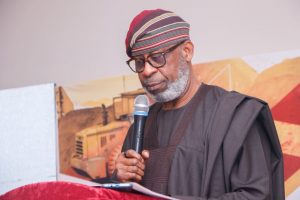The National Oil Spill Detection and Response Agency (NOSDRA) is in charge of oil spill in the Niger Delta environment, HELEN OJI takes a look at the environmental management and sustainability eff orts of the agency. Th e centrality of the environment to the sustenance of life and the challenges of safeguarding it informed the decision of the United Nations (UN) to set aside every June 6 to commemorate environment annually.
The UN as a convergence of global interests has played a pivotal role in drives to protect our planet earth from pollution and environmental degradation resulting from man’s undue interference with nature, as well as from natural disasters. The world body has demonstrated its unflagging commitment to addressing the grave problems facing the global environment through series of international summits, conferences and workshops.
Some of the problems include deforestation, desertification, drought, water shortage, pollution and climate change and the associated global warming. It is hear t warming that Nigeria, as part of the international community, is increasingly becoming conscious of the need for environmental management and sustainability. Part of the initiatives by successive governments in the country in this direction are the formulation of the national policy on environment, articulation of various environmental laws and establishment of the federal environmental protection agency (FEPA) in 1988, which was later replaced with the Federal Ministry of Environment in June 1999.
The National Oil Spill Detection and Response Agency joined other members of the international community to mark the World Environment Day (WED), while the theme of this year’s celebration is “Forest, Nature at your Service”. It is interesting to note that the National Oil Spill Detection and Response Agency (NOSDRA), that is a parastatal under the Federal Ministry of Environment, is a key stakeholder in environmental management and preservation in Nigeria.
They play a lead role in ensuring timely, eff ective and appropriate response to oil spills, as well as supervising immediate cleanup and remediation of all impacted sites as best as possible. According to the DirectorGeneral, NOSDRA, Sir Peter Idabor, the agency is also mandated to identify high risk and priority areas in oil bearing communities for protection, in addition to ensuring compliance of oil industry operators with all existing environmental legislations in the petroleum sector. “We nurture and sustain a zero tolerance for oil spill incident in the Nigerian environment, while our mission statement is to restore and preserve our environment by ensuring best oil fi eld, storage and transmission practices in exploration, production and use of oil in the quest to a sustainable development in Nigeria,” he added Also, the agency according to him, coordinates the implementation of tier 3 oil spill response system, as well as regulates and monitors tiers 1 and 2, which are our spill response system of individual oil companies and cooperatives (Clean Nigeria Associates, CAN) which is responsible for the major spill requiring the mobilization of available resources and depending on the circumstances, which likely mobilized the regional and international systems. Among the measures of NOSDRA to anticipate and curb oil spill incident in the Nigerian environment are’; the opening of zonal offi ces in Port-Harcourt, Warri, Uyo, Lagos, kaduna and Akure to ensure compliance with all existing environmental legislations and detect of oil spills in the petroleum sector. Establishment of international Command and Control Center at NOSDRA’s headquarter on the purpose of detecting and managing oil spill incidents in the Geographic Information System(GIS) technology.
“ E n f o r c e m e n t o f environmental standards and guidelines to ensure that all e x i s t i n g e n v i r o n m e n t a l regulations are complied with by oil companies in the country and maintenance of the off shore and onshore oil facilities. Meanwhile, the Senate has commenced legislative processes aimed at prohibiting gas fl aring and imposing stiffer penalties on defaulting oil and gas fi rms, as proposed by the Gas Flaring Bill 2017. The bill is intended to address the inadequacies and shortcomings of the Associated Gas Re-Injection Act of 1979, provide stiff er penalties in line with current economic realities, and ensure the achievement of the National Flares-out Target of January 1, 2030. Th e bill, which recently passed through second reading, also makes it mandatory for operators to submit gas utilization plan within 90 days of the commencement of the Act for eff ective monitoring. The sponsor of the bill, Senator Bassey Albert Akpan, representing Akwa Ibom North East constituency, speaking on the bill, said that gas flaring remains one of the most dangerous environmental and energy waste practices in the oil industry. He added that the continuous p r a c t i c e h a s d i s a s t r o u s consequences on human and environmental health and causes loss of revenue by depriving the government of tax and trade opportunities. Bassey, who is also the Chairman of the Senate Committee on Gas, stated that the emphasis on creation of infrastructure for gas utilisation should be a condition for grant of licenses, as being done in countries like the United States. “Th e bill also makes specifi c provisions for the installation of requisite gas flare meters equipped with facilities that enable real time, online data retrieval for independent reporting and monitoring by the industry regulator. “The current gas flare penalty of N10 per 1,000scf is too low, and not in line with current economic realities and encourages continuous gas flaring by operators with its attendant negative effect on our environment instead of encouraging investment in infrastructure by the operators to make gas available for our domestic use,” he said. Furthermore, he said that there is a need to increase the gas flaring penalty to an appropriate and commensurate level suffi cient to de-incentivise the practice of gas flaring, and introduce other market measures to encourage effi cient gas utilization.



